
Für eine deutsche Übersetzung dieser Seite einfach die Brandenburger Flagge anklicken
 |
Click the Brandenburg Flag for a German translation Für eine deutsche Übersetzung dieser Seite einfach die Brandenburger Flagge anklicken |


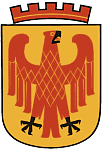 |
Home Towns - Potsdam, GermanyPotsdam's Rulers throughout the Centuries1688-1918 |
 |


 |
This site is part of our Potdam, Germany site. Click the left turn sign to get back to the Potsdam start site. |


 History is not made by individuals, but by people. However, the history made by the people is often associated with the rulers of the time. Here is a list of those who took credit and blame for Potsdam's history. We are not trying to compete with Wikipedia's comprehensive list of Rulers of Brandenburg although we have been trying to fill in some blanks here and there. Biographical references are generally limited to events affecting Potsdam and/or Brandenburg. The dates under the names don't refer to birth and death but rather to the time in office. Blue links lead to sites with more information, in most cases to a Wikipedia article. In some cases, we couldn't find an article in English language; in this case, Green links lead to articles in German language. This is Part 5 of our Potsdam's Rulers Through the Centuries site, covering the years 1688 through 1918. |
 |
Click the left-turn sign to get back to the previous section. Or, if you are interested in a different time period, click the U-turn sign to get to the "Rulers" start page. |
 |


  |
Frederick I of Prussia (Frederick III of Brandenburg) 1688 - 1713  Frederick William's first two sons, William Henry and Charles, died at the ages of one and 19, respectively. Eventually, the Great Elector was succeeded by his third born, Frederick. He became Elector of Brandenburg under the name Frederick III, but history knows him better as Frederick I of Prussia.  His grandson, Frederick the Great later wrote about Frederick I, that "His contribution was great in matters of small importance, and small in great." With the outmost respect for Frederick the Great, we disagree and think Frederick I made a great contribution to Brandenburg and Prussia. |
 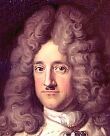 Biography at Wikipedia
Biography at Wikipedia
|
According to Germanic law at that time, no kingdoms could exist within the Holy Roman Empire and so Frederick I was at first just Duke of Prussia
but that changed at the turn of the century. From 1701 until 1714, all European powers were engulfed in yet another power struggle, the
War of the Spanish Succession. Frederick's Prussia joined
an alliance with the Holy Roman Emperor and in return, Frederick received the right to call himself "King in Prussia," turning Prussia into an
independent Kingdom within the German Empire.
 He also was a great a patron of the arts and founded the Prussian Academy of Arts (1696) as well as the Academy of Sciences (1700). |

  |
Frederick William I of Prussia (Frederick William II of Brandenburg) 1713 - 1740  Frederick William I of Prussia was born in 1688 in Berlin, making him a true Brandenburg native. His title as Prince Elector was Frederick William II, but he is probably best known as "The Soldier King." As Prussian King, he initiated several civil service reforms and developed the international reputation of Prussia, especially its military. His most famous military elite unite were the Potsdam Giants.  As King of Prussia, he strictly regulated government spending, resulting in a large surplus in the treasury which was kept rather bizarrely in his basement. He drafted a manual of regulations for state officials, containing 297 paragraphs, encouraged farming, reclaimed marshes and built up one of the most powerful armies in Europe. Despite all of his love for the military, he was more of a diplomat than a soldier and the observation about the power of the pen being mightier than the sword has sometimes been attributed to him. |
 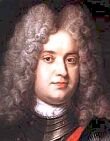 Biography at Wikipedia
Biography at Wikipedia
|
No King before him shaped Potsdam as profoundly as the "Soldier King." He declared Potsdam the "Heart of the Military Monarchy" and that heart
started beating loud and powerful. In 1713, only a few months after his inauguration, the first battalion of 800 riflemen marched into town, three
more battalions followed shortly after and in 1740, at the end of Frederick William I's reign, 3,500 soldiers were stationed in Potsdam.
 The garrison created its own industry and more and more people were needed to support the army. Between 1713 and 1740, the town's civilian population grew from 1,500 to almost 12,000 and most of them made a living with supplying the military. Two totally new quarters, the first and second city extensions were built in 1713 and 1733. Also, in 1730, the building of the Dutch Quarters started.  The list of famous buildings erected under Frederick William I is endless and comprises, amongst others, the Garrison Church, the Church of the Holy Spirit, the Great Military Orphanage and the Great City School.  Since 1660, Potsdam had an inofficial status as second residency. In 1730, the Soldier King made it official and declared Potsdam a "Capital." |

  |
Frederick II of Prussia (Frederick IV of Brandenburg) 1740 - 1786  Frederick II's relationship with his father was estranged, to say the least, but the Soldier King's heritage certainly helped Frederick on his way to an honorable title he shared with Alexander, Peter and very few others: Frederick the Great. Frugal in every matter that didn't concern the military, Frederick William I left his son with a huge surplus in the treasury which Frederick used to transform Prussia from a European backwater to an economically strong and politically reformed state. He enlarged Prussia's territory by acquiring Silesia and West Prussia. Furthermore, his reclamation of land in the Oderbruch was later referred to as "...a province conquered in peace." |
 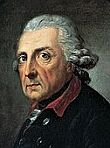 Biography at Wikipedia
Biography at Wikipedia
|
Efficient in military matters, Frederick William I also left his son with one of Europe's strongest armies, and Frederick the Great, though later
known as "The Philosopher on the Throne" had no problems using it in two wars with Austria. Later, his march into Saxony started the
Seven Years War. This war lasted from 1756 through 1763. It was later
sometimes called the "First World War" for it was the first war that involved all of the world's super powers.
(In America, a portion of this war is known as the French and Indian War).
 Forty years later, when Napoleon conquered Potsdam, he would visit Frederick's tomb and say, "Gentlemen, this was one of the greatest commanders of whom history has made mention. If he were alive today, I should not be standing here."  But Frederick the Great would not only be remembered for his military talent. He would later be known as "The Philosopher on the Throne," and as a gifted musician and architect. Under his influence, the ideas of the Age of Enlightenment reached Germany. His influence on architecture was so big that the whole era would later be known as Frederician Rococo. Under his reign, Potsdam became Prussia's main residency, the City Palace was finished and Potsdam's great castles Sanssouci and the New Palace were built. |

  |
Frederick William II of Prussia (Frederick William III of Brandenburg) 1786 - 1797  Frederick William II, born 1744 in Berlin was a nephew of Frederick II. He became heir to the throne of Prussia on his father's death in 1758, since Frederick II had no children. His reign only lasted for 11 years and Frederick William II never managed to step out of the shadow of his great predecessor. Instead, when he died in 1797, he left the state in bankruptcy and confusion, the army decayed and the monarchy discredited. |
 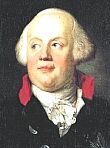 Biography at Wikipedia
Biography at Wikipedia
|

  |
Frederick William III of Prussia (Frederick William IV of Brandenburg) 1797 - 1840  Frederick William III, born 1770 in Potsdam succeeded the throne in 1797. At once, he cut down the expenses of the royal establishment, dismissed his father's ministers and reformed the most oppressive abuses of the late reign. His rein coincides with the biggest war of the 1800s, which profoundly reshaped the European and German landscape.  In 1799, ten years after the French Revolution and two years after Frederick William III became Prussian king, Napoleon Bonaparte became First Consul of the French Republic. Five years later, Napoleon crowned himself Emperor of France, turned his armies against every major European power and soon dominated continental Europe through a series of military victories. |
 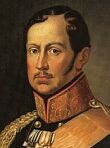 Biography at Wikipedia
Biography at Wikipedia
|
| Following military defeat in 1806, the last Emperor of the Holy Roman Empire, Austrian King Francis II abdicated on August 6, 1806, officially dissolving the first German Empire after a reign of 844 years. As a result, Prussia became an independent Kingdom and Frederick William III was the last in a line of 21 Brandenburg-Prussian Prince Electors and the first King of an independent Prussia. |

  |
Louise of Mecklenburg-Strelitz 1797 - 1810  Frederick William's wife died at the age of only 34. She is listed here since she is adored and worshiped until the present day like no other Prussian princess before or after. As the first Queen of an independent Prussia and as mother of ten children (one of which later became German Emperor while another one became Empress of Russia), she soon had reached a celebrety status only comparable to that of the late Princess Diana almost 200 years later. |
 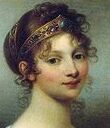 Biography at Wikipedia
Biography at Wikipedia
|
| Frederick William III first tried to remain neutral in Europe's clash with Napoleon, but largely influenced by Queen Louise he joined a coalition with Alexander I, Tsar of Russia. However, Prussia's army was utterly defeatetd in October 1806 at the Battle of Jena-Auerstedt and on October 24, 1806, Napoleon marched into Potsdam. |

  |
French Occupation 1806 - 1813  Napoleon paid his respect to Fredrick the Great, visiting his tomb in the Garrison Church on the night of his arrival in Potsdam, but he didn't respect the rest of the town very much. From October 1806 through December 1808, Potsdam was used as a cavalry depot and two of the town's main churches, the Church of the Holy Spirit and the French Church were turned into horse stables.  In 1807, defeated Prussia not only lost half of it territory but was also forced to join an alliance with Napoleon. In 1809, the French troops under General Bourcier left town and Potsdam was officially again under Prussian control, though only as a French puppet. Many Prussians opposed the alliance with Napoleon and the area was in constant unrest. Most prominent was a revolt lead by Major Ferdinand von Schill in 1809. |
  Biography at Wikipedia
Biography at Wikipedia
|
  |
In 1812, after Napoleon's defeat in Russia, Prussia renewed her alliance with Russia and many of Potsdam's sons and daughters fought in the
European battle against Napoleon. The list ranks from General
Ludwig Yorck, born in Potsdam in 1759 to a girl named
Eleonore Prochaska, who was later called "Potsdam's Joan of Arc." She
was born in Potsdam in 1785 and, disguised as a man, died fighting with the
Lützow Free Corps in 1813.
 In response to Prussia's shift of alliance, French troops reentered Potsdam in January 1813 in an attempt to capture King Fredrick William III. But the King and most of his soldiers managed to flee to Silesia and organized resistance against Napoleon from there. In March 1813, Russian Cossacks reached Potsdam and effectively ended seven years of French rule. |
 |
After Napoleon's final defeat, Prussia regained the territory previously lost to France. During the occupation, Frederick William III had promised to supply Prussia with a constitution. After his power was restored, he abandoned his promises and turned towards political reaction, but the signs of profound change were already on the horizon. |

  |
Frederick William IV of Prussia 1840 - 1861  Frederick William IV was called "The Romantic on the Throne." But instead of living his nostalgic dreams he was tossed into a changing world. He navigated the turmoil as a true opportunist. When the Revolution of 1848 reached Prussia, he initially moved to repress it with the army, but later decided to recall the troops and place himself at the head of the movement, committing himself to German unification. He formed a liberal government, convened a national assembly, and ordered that a Constitution of the Kingdom of Prussia be drawn up. However, once his position was more secure again, he quickly had the army reoccupy Berlin and dissolved the assembly in December. |
 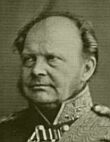 Biography at Wikipedia
Biography at Wikipedia
|
| In 1849, he gave away the chance of a unified Germany, when he refused the offer of the Frankfurt Parliament to become German Emperor. After a stroke in 1857 left him partially paralyzed, his brother William served as regent from 1858 until the king's death in 1861, at which point he acceded the throne himself as William I. |

  |
William I 1861 - 1888  "Today is a sad day for today we bury Prussia," wrote King William I in his diary on January 18, 1871, when he was crowned Emperor of a unified Germany. The man who became the first German Emperor felt a lot more Prussian than German. William was born in Berlin in 1797 and earned his first merits as an 18 year old soldier in the battle of Waterloo - Napoleon's final defeat. Later, in 1848, he "earned" the nickname "Prince of Grapeshot," when he used canons to crush a revolt that was aimed at his elder brother King Frederick William IV.  William served as Prussian regent since 1858 and acceded the throne as William I in 1861. Between 1864 and 1866, William did his part in expanding Prussia in two wars with Denmark and Austria. In 1870, diplomatic controversies lead to yet another war with France. |
 |
Following a quick Prussian victory, other German states joined Prussia and later accepted incorporation into a united German Empire, leading to
William's coronation as German Emperor. Prussia became a kingdom within the German empire and the German emperors also remained Prussian Kings.
 Just for the fun of it, here is the full title of His Imperial and Royal Majesty:  His Imperial and Royal Majesty Wilhelm the First, by the Grace of God, German Emperor and King of Prussia; Margrave of Brandenburg, Burgrave of Nuremberg, Count of Hohenzollern; sovereign and supreme Duke of Silesia and of the County of Glatz; Grand Duke of the Lower Rhine and of Posen; Duke of Saxony, of Westphalia, of Angria, of Pomerania, Lunenburg, Holstein and Schleswig, of Magdeburg, of Bremen, of Geldern, Cleves, Jülich and Berg, Duke of the Wends and the Kassubes, of Krossen, Lauenburg and Mecklenburg; Landgrave of Hesse and Thuringia; Margrave of Upper and Lower Lusatia; Prince of Orange; Prince of Rügen, of East Friesland, of Paderborn and Pyrmont, of Halberstadt, Münster, Minden, Osnabrück, Hildesheim, of Verden, Kammin, Fulda, Nassau and Moers; Princely Count of Henneberg; Count of the Mark, of Ravensberg, of Hohenstein, Tecklenburg and Lingen, of Mansfeld, Sigmaringen and Veringen; Lord of Frankfurt. |

  |
Otto Prince of Bismarck Prussian Prime Minister 1862 – 1890; Chancellor of the German Empire 1871 - 1890  Otto Fürst von Bismarck was not a monarch and never officially ruled a country, but Prussian and German history would have taken a very different turn without Bismarck pulling the strings. When William I ascended the Prussian throne, he inherited a conflict between the King and the liberal parliament. William's conservative solution for the conflict was his appointment of Otto von Bismarck to the office of Prime Minister. According to the Prussian constitution, the Prime Minister was responsible solely to the king, not to parliament.  Bismarck liked to see his working relationship with William as that of a vassal to his feudal superior. Nonetheless it was Bismarck who effectively directed the politics, domestic as well as foreign; on several occasions he gained Wilhelm's assent by threatening to resign. Nicknamed "The Iron Chancellor," Bismarck held an important role in the German government and greatly influenced German and international politics both during and after his time of service. |
 |

  |
Frederick III 1888  In German history, the year 1888 is referred to as "The year of three Emperors." Frederick's father, William I, ruled Germany until the day of his death at the age of 90 on March 9, 1888, but Frederick III's reign only lasted 99 days for he died of laryngeal cancer on June 15, 1888.  Frederick professed a hatred of warfare, and was praised by friends and enemies alike for his humane conduct. It is widely believed that had he ascended the throne earlier or just had lived longer, he and his wife, Princess Victoria, daughter of Queen Victoria of Great Britain, would have transformed Germany into a liberal state, averting the events preceding World War I. However, history had other plans. |
 |

  |
William II 1888 - 1918  After his father's premature death, William II became German emperor at the age of only 29. He perceived his father's liberalism as a weakness and resolved to rule with a firm hand. Within two years of ascending the throne had forced the departure from office of Bismarck, his grandfather's long-serving chancellor, adviser, and architect of the Second Reich. This dismissal began to remove the props of peace, while his provocative naval rearmament strengthened the diplomatic and military ties between Britain and France.  While William was certainly not in command of the events of July-August 1914, he still helped lay the foundations for WW I. As the war went on his real power declined still further. In early November 1918 he talked of leading his army personally to crush the reported outbreaks of mutiny, yet in November, the Revolution had reached Berlin Germany and William abdicated without a whimper and fled the country with his family. |
 |

 |
In November 1918, the Revolution ripped through Germany. On November 6, it
reached Berlin and on November 9, it ended 990 years of German monarchy and 20 generations of the reign of the House of Hohenzollern. the last Emperor
fled Berlin and spent the rest of his life on his estate at Doorn in Holland. The Republic was declared not just once, but twice. At 2 PM, social democrat Philipp Scheidemann, standing on a balcony at the German Reichstag declared the German Republic. Two hours later, his communist counterpart Karl Liebknecht, standing in front of the Berlin City Palace, declared Free Socialist Republic of Germany. |
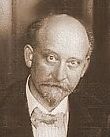 Scheidemann
Scheidemann
|
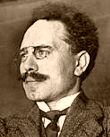 Liebknecht
Liebknecht
|
 The Socialist Republic was short-lived and ended in January 1919 with the assassination of its leaders. The German Republic - for better or worse - lead to the constitution of the Weimar Republic in August 1919. |



|
Post Monarchy 1918 - present The almost hundred years after the fall of the Hohenzollern monarchy brought a first attempt of democracy, political turmoil, a Nazi coup, a devastating World War, followed by Soviet occupation and communist rule and eventually a peaceful revolution that finally restored the town of Potsdam and the state of Brandenburg to its old glory. |
 |
Click the right-turn sign to continue to Part 6 of our
Potsdam's Rulers Through the Centuries site, covering the lat almost 100 years (1918-present). Or click the u-turn sign to returne to the "Rulers" start site. |

|


 Back to Potsdam Page |
 Back to Home Towns |
 Back to Germany Page |
 Back to English Main Page |
 Back to Start Page |